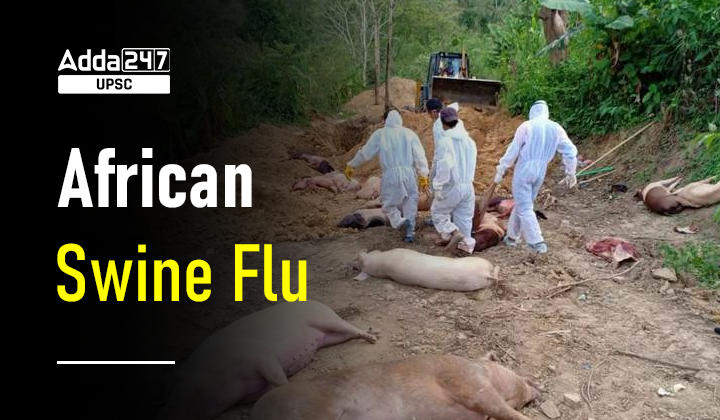Table of Contents
African Swine Flu: Why in news?
- Kerala confirms African Swine Flu at pig farm in Kottayam district.
- The virus infection was confirmed after samples taken from the farm were tested at the National Institute of High-Security Animal Diseases in Bhopal.
- A one-kilometer stretch around the farm has been declared infected where 48 pigs have been culled as a preventive measure. A ten-kilometer radius around the farm is being closely monitored.
African Swine Flu: Background
- Since emerging from East Africa in the early 1900s, African Swine Fever has moved through sub-Saharan Africa and has been reported in 32 countries since 2005.
- 2022 has seen the disease detected worldwide including in India.
- The disease has reached multiple countries across Asia, the Caribbean, Europe, and the Pacific, affecting both domestic and wild pigs.
African Swine Flu: What is African Swine Flu (ASF)?
- ASF is a severe viral disease that affects wild and domestic pigs typically resulting in an acute haemorrhagic fever.
- The disease has a case fatality rate (CFR) of about 100 percent.
- Its routes of transmission include direct contact with an infected or wild pig (alive or dead), indirect contact through ingestion of contaminated material such as food waste, feed or garbage or through biological vectors such as ticks.
- The disease is characterised by the sudden deaths of pigs.
- Other manifestations of the disease include high fever, depression, anorexia, loss of appetite, haemorrhages in the skin, vomiting and diarrhoea among others.
- It is important that determination of ASF is made through laboratory testing and it is differentiated from Classical Swine Fever (CSF), whose signs may be similar to ASF, but is caused by a different virus for which a vaccine exists.
- Even so, while ASF is lethal, it is less infectious than other animal diseases such as foot-and-mouth disease.
- But as of now, there is no approved vaccine, which is also a reason why animals are culled to prevent the spread of infection.
African Swine Flu: Is it threatful for Humans?
- African Swine Flu is not a zoonotic disease. It will not spread from pigs to other animals or human beings.
- Even though the disease is highly contagious it is not a threat to humans as it can not be transmitted from animals to humans.
- The disease can only spread from one pig to another.
African swine flu: A threat to food security and biodiversity
- Pigs are a primary source of household income in many countries.
- The spread of ASF across the world has devastated family-run pig farms, often the mainstay of people’s livelihoods and a driver of upward mobility.
- It has also reduced opportunities to access healthcare and education.
- Moreover, pork meat is one of the primary sources of animal proteins, accounting for more than 35% of the global meat intake.
- Hence, this disease poses a serious problem for food security worldwide.
- This disease is also a concern for biodiversity and the balance of ecosystems, as it affects not only domestic farmed pigs, but also wild boars, including native breeds.
African Swine Flu: Measures to Control ASF spread
- During outbreaks and in affected countries, controlling the spread of African swine fever can be difficult and must be adapted to the specific epidemiological situation.
- General sanitary measures that may be implemented include:
- early detection and humane killing of animals (with proper disposal of carcasses and waste),
- thorough cleansing and disinfection,
- zoning/compartmentalisation and movement controls,
- surveillance and detailed epidemiological investigation, and
- strict biosecurity measures on farms.



 TSPSC Group 1 Question Paper 2024, Downl...
TSPSC Group 1 Question Paper 2024, Downl...
 TSPSC Group 1 Answer key 2024 Out, Downl...
TSPSC Group 1 Answer key 2024 Out, Downl...
 UPSC Prelims 2024 Question Paper, Downlo...
UPSC Prelims 2024 Question Paper, Downlo...




